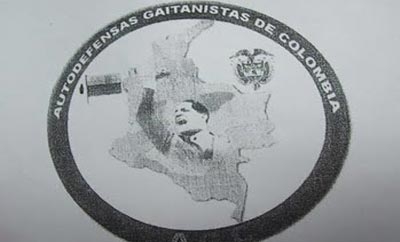The most powerful and feared of Colombia’s narco-paramilitary groups — the Gaitanistas — has called for political recognition and inclusion in peace talks in a statement that strongly suggests the group’s leaders are planning a surprise exit strategy.
Going under the group’s official name “the Gaitanist Self-Defense Forces of Colombia,” the Gaitanistas, also known as the Gulf Clan, Urabeños, and Gaitanist Self-Defense Forces of Colombia (Autodefensas Gaitanistas de Colombia – AGC), issued a communiqué, in which they praised the current peace talks between the government and the guerrillas of the Revolutionary Armed Forces of Colombia (FARC), but said there would be no lasting peace while they were not part of the process.
The Gaitanistas called for recognition as the “third actor” in Colombia’s conflict, labeling themselves a group of armed civil resistance. “With 7,000 armed men and a nationwide presence, we cannot be ignored,” the statement read.
The group also denied any involvement in the drug trade, apart from taxing producers in areas where they operate, and blasted the Colombian authorities for corruption, which they identified as the country’s “principal problem.” They also denied claims the group is linked to the so-called “anti-land restitution army” and praised the government for its initiative to restore stolen lands to the displaced.
In the statement, the group also criticized the peace process with the paramilitary organization that spawned it, the United Self-Defense Forces of Colombia (AUC), and reserved specific criticism for ex-President Alvaro Uribe, both for his role in the AUC demobilization and for his opposition to current peace talks.
InSight Crime Analysis
This is not the first time the AGC have employed political rhetoric in their public communications, but it is the first time the group has shown a desire to engage with the government as political actors. Behind this shock move may well be a strategy devised by leaders to bow out of the underworld on their own terms.
Over the last few years, the AGC have rapidly expanded throughout the country and positioned themselves to become the dominant force in Colombian organized crime. However, they have also seen a steady loss of important leaders, such as Francisco Morelo Peñata, alias “El Negro Sarley,” Henry de Jesus Lopez, alias “Mi Sangre,” and several members of the group’s dominant clan, the Usugas, and it is possible the maximum command feels the net closing in.
In this case, they may well be looking to try and negotiate an exit on the most favourable terms possible. The last generation of leaders in rival group the Rastrojos similarly bowed out just at the peak of the group’s power. However, while Rastrojos leaders negotiated their surrender as drug traffickers, it seems the AGC are turning to a strategy employed by the original Rastrojos, who tried to pass off their narco-army as an AUC unit and claim demobilization benefits.
The plan failed, and given the overwhelming evidence that the AGC are a criminal not political force, this latest play is also unlikely to prove successful.

